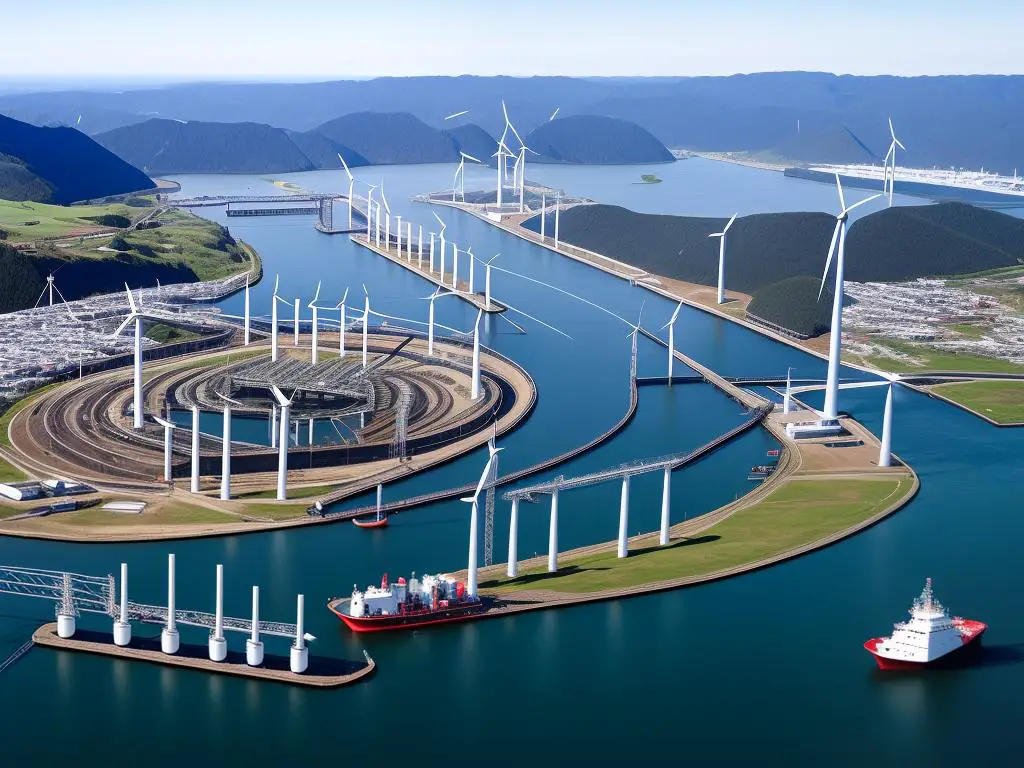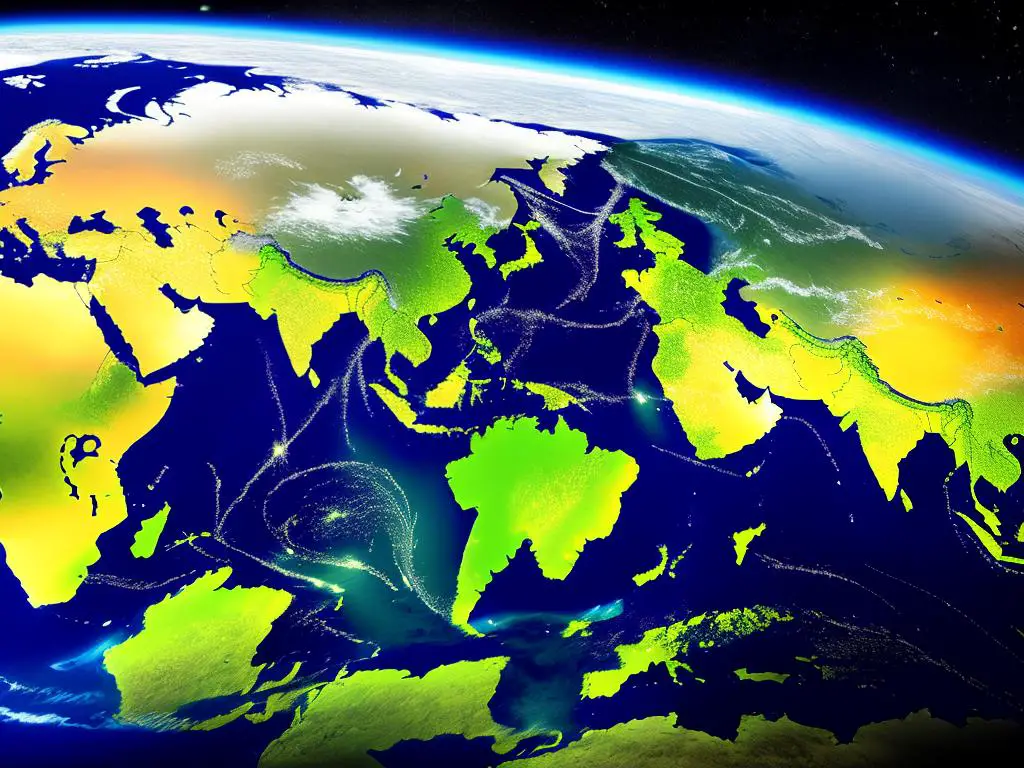Understanding the Relevance of Energy Security: Energy security plays a critical role in the stability and prosperity of nations worldwide. It is a complex yet fundamental aspect that reflects a country’s capacity to meet its inhabitants’ energy needs reliably, affordably, and sustainably. However, given our growing global population and exponentially increasing energy demands, energy security’s significance extends beyond mere utility provision. It becomes a cornerstone of national security, economic stability, political control, and diplomatic relations with foreign nations. This discourse will decipher the concept of energy security, its importance, followed by the potential challenges it faces while shedding light on historical energy crises and potential strategies to improve energy security.
The Concept of Energy Security (Understanding the Relevance of Energy Security)
Definition and Components of Energy Security
Energy security is a comprehensive concept concerned with the reliable, affordable, and sustainable supply of energy. It encapsulates a wide variety of factors as it aims to ensure an uninterrupted energy flow available to all market participants at affordable prices. Energy security is a multifaceted concept; as such, it encompasses aspects such as energy availability, affordability, and sustainability, to which we now turn.
Availability of Energy Sources
The availability of variable energy sources refers primarily to the adequacy of energy supply. This aspect is of prime importance as the lack, or even the perception of lack, can significantly impact various economic sectors. An adequate supply of energy sources guarantees the smooth operation of industrial and manufacturing sectors, ensures the proper functioning of households, and promotes the development of technology and innovation. In cases of resource scarcity, geopolitical tensions may arise, creating the potential for conflicts over energy supply, which further underscores the crucial importance of energy availability for ensuring energy security.
Affordability of Energy
The affordability dimension relates to the accessibility and cost-effectiveness of energy sources. Consumers should have access to reasonably priced energy supplies, which are essential for sustaining economic growth and maintaining social stability. However, price volatility, usually triggered by supply-demand imbalances and geopolitical disruptions, can dramatically affect energy affordability. Hence, safeguarding against such instability is paramount to the concept of energy security.
Sustainability of Energy Sources
Energy security also includes the sustainability of energy supplies, ensuring that the exploitation of energy resources does not lead to detrimental environmental impacts. It emphasizes the transition from conventional, non-renewable energy sources to renewable and cleaner energy alternatives. Moreover, the sustainability component aligns with the global aim to combat climate change, making energy security an indispensable element in achieving a sustainable future.
Energy Security Vs Energy Independence
Energy security should not be mistaken for energy independence. Energy independence refers to a state where a nation is either entirely self-sufficient in energy sources or maintains a minimal level of energy imports. However, energy independence does not automatically translate into energy security. A nation could be energy independent but still face issues in affordability or sustainability of energy. This distinction underlines that energy security is a more comprehensive and holistic concept, focusing not only on the availability of energy supplies but also on their cost-effectiveness and environmental impact.
Introduction
The basic components of energy security are the constant availability, affordability, and sustainability of energy supplies. It’s hard to overstate the importance of secure and stable energy resources, considering the crucial part they play in bolstering economic growth, promoting societal wellbeing, and preserving environmental health. Thus, guaranteeing a reliable, reasonably priced, and sustainable energy supply is a global priority of utmost significance.

Why Energy Security Matters
Understanding Energy Security: An Economic Imperative
The linchpin of energy security is the uninterrupted provision of energy at a budget-friendly cost. It’s a vital cog in the wheel of a thriving economy, impacting virtually every sector’s functionality. The assurance of energy access smoothens production processes, underpins industries, and perpetuates economic growth. Conversely, energy supply disruptions can wreak havoc on an economy—stifling production, ramping up expenses, and putting a spanner in the works of trade.
Energy insecurity could be the harbinger of an economic nightmare, sparking inflation, fueling unemployment rates, and pulling the plug on economic activities. For instance, in situations when energy prices skyrocket, the cost of doing business likewise escalates, which could lead to profit downturns, job retrenchment, and even liquidation of firms during extreme cases, thereby sending the economy into a tailspin. Given these stakes, it’s clear that secure and steadfast energy resources are indispensable for a nation’s economic health and prosperity.
Energy Security’s Role in National Security and Geopolitical Stability
Energy security is not confined to economic realms but also extends to national security and geopolitical contexts. Countries heavily dependent on foreign sources of energy are often left vulnerable to supply disruptions or manipulations that could negatively impact their economies. These forms of energy insecurity can contribute to increased geopolitical tensions as countries vie for control over energy resources, leading to potential conflicts.
Furthermore, energy security is integral to a nation’s ability to power its defense mechanisms. It is the backbone for military operations, from the fuel needed for military vehicles to the electricity required for command centers. Without a secure energy source, a country’s defense capabilities may be compromised, impinging on its national security.
Understanding Substation Automation & IoT Concepts: A Complete guide for beginner
Fueling Geopolitical Tensions and Potential Conflicts
The strategic significance of energy resources often becomes a cause for conflict among nations—particularly in regions where these resources are abundant. It is clear that theoretical access to energy resources does not equate to actual energy security— access can be denied through geopolitical tensions or outright armed conflict. Instances like these have occurred multiple times in history, exemplifying how energy security contributes to the escalation of international disputes.
Understanding the Importance of Energy Security
To conclude, the importance of energy security cannot be overstated—it is not just crucial for powering our homes and industries, but also for shaping our nation’s stability, economy, national security, and international relations. With the rapidly increasing global energy demands and the unpredictability of the energy climate, prioritizing and funding energy security initiatives and policies is of utmost importance. In addition, it is essential for nations to diversify their energy sources and enhance their capacity to recover from potential disruptions for a secured future.

Challenges and Respects to Energy Security
Identifying the Obstacles to Energy Security
A key component of energy security is the consistent and accessible provision of energy resources at a cost-effective rate. However, there are numerous ongoing threats that could potentially destabilize this vital aspect of our day-to-day lives. The first step towards finding effective solutions to these issues and ensuring a secured, sustainable future is to recognize and comprehend these challenges.
Arguably the biggest challenge to energy security is the rapid depletion of non-renewable resources.
Fossil fuels – such as coal, oil, and natural gas – still constitute the majority of the world’s energy supply. Unfortunately, the finite nature of these resources means we are swiftly approaching a point where demand outstrips supply. This situation could result in higher energy prices, potentially threatening economic stability and increasing energy poverty.
Another significant challenge lies in the use of renewable energy sources
such as solar and wind power. While renewable energy resources are cleaner and more sustainable, they are also intermittent. The power harnessed from these sources depends on weather conditions, making them less reliable than non-renewable resources. The lack of advanced technology and infrastructure to efficiently store and distribute renewable energy complicates the issue further.
Global Demand and Political Instability
The global demand for energy is growing due to population growth, industrial development, and digitalization. This increase is set to further strain our already dwindling non-renewable resources and burden our underdeveloped renewable energy industry.
Equally concerning is the impact of political instability on energy security. Energy resources and infrastructure are often concentrated in politically unstable regions. Due to this, any political instability or conflict can disrupt the flow of energy, leading to shortages, and price increases.
For example, the Middle East, a major global supplier of oil, is a region frequently affected by political instability. Such geopolitics can significantly affect global oil supply and pricing. Additionally, energy infrastructure can also become target during war or conflict, further exacerbating the problem.
Natural Disasters and their Impact
Natural disasters, too, pose a severe risk to energy security. These kinds of events can damage infrastructure involved in the production, transportation, and delivery of energy. Whether it’s a hurricane destroying an offshore oil drilling facility, a flood damaging a nuclear power plant, or an earthquake rupturing pipelines, the result is the same: disruption of the energy supply, precipitating a cascade of economic, social, and political consequences.
To successfully meet and navigate an increasingly challenging environment, we must prioritize diversifying our energy resources and make substantial investments in the advancement of renewable energy technologies and their infrastructure. Alongside this, it’s fundamental that strategies to control demand are put into place, that we enhance energy efficiency and fortify the resilience of our energy infrastructure. The significance of energy security in this context is immensely important. It’s more than just a developmental necessity; it’s deeply intertwined with every aspect of modern life.

Examples of Energy Security Crisis
An Illustrative Case: The 1970s Oil Crisis and the Importance of Energy Security
A key demonstration of a disruption to energy security can be seen in the 1970s oil crisis. The turmoil was triggered by the Organization of Arab Petroleum Exporting Countries (OAPEC) imposing an oil embargo on countries they believed were backing Israel during the Yom Kippur War.
The direct consequence of this action was a staggering four-fold surge in oil prices, causing severance in global economies—especially notable in the United States, Western Europe, and Japan. This predicament highlighted these developed nations’ serious dependence on foreign oil, illustrating the critical role of energy security in a nation’s strategic planning.
In reaction to these events, the countries that were affected made concerted efforts to diversify their energy resources, enhance energy efficiency, and establish strategic petroleum reserves. This crisis was also a catalyst for heightened investments in renewable energy sources like solar and wind power.
The 1990 Persian Gulf Crisis: Energy Security in the Crosshair
The 1990 Persian Gulf crisis sparked by Iraq’s invasion of Kuwait also served as a stark reminder of the importance of energy security. The invasion resulted in the rise of global oil prices and triggered fears of a severe energy shortage.
At that time, both Iraq and Kuwait were two of the world’s largest oil producers. Hence, the conflict disrupt global oil supply, leading to significant economic uncertainty and turmoil. It demonstrated the potential geopolitical risks associated with heavy reliance on a particular region for energy supplies.
The crisis led to accelerated efforts towards energy source diversification and conservation. Furthermore, it underscored the importance of creating strategic alliances and maintaining military capabilities to protect energy supplies.
Russia-Ukraine Gas Disputes: An Ongoing Energy Security Concern
The recurring Russia-Ukraine gas disputes provide a contemporary example of energy security risks. These disputes have repeatedly disrupted natural gas supplies to many European countries that heavily rely on Russian gas pipelines transiting Ukraine.
The tensions have underscored the geopolitical risks associated with excessive reliance on a single energy supplier and the vulnerabilities of the current energy infrastructure. It has led to significant efforts by European governments and companies to diversify energy suppliers, develop alternative supply routes, and invest in renewable energy and nuclear power.
Overcurrent Protection in Power Substation
A Close Examination of Energy Security Crisis Situations
The importance of energy security is brought to light through an analysis of past and ongoing energy crises, which starkly demonstrate the potentially catastrophic outcomes of threats to our energy security. All too often, we’ve seen the impact of over-reliance on a particular form of energy, a specific provider, or a distinct route. These situations not only reveal the economic, geopolitical, and social weaknesses that can be exploited but also emphasize the urgent need for well-planned, robust energy security measures. Strategies such as improving energy efficiency, diversification of energy sources and suppliers, strategic reserves of energy, and strong policies regarding geopolitics and defense become a necessity.

Improving Energy Security
Decoding The Concept Of Energy Security
Energy security is defined by four key components: the availability, accessibility, affordability, and acceptability of energy to consumers. This concept isn’t just about energy supplies; it’s also pivotal in maintaining a nation’s economic stability and social coherence. Risks to energy security can take many forms, including technological disruptions, geopolitical unrest, extreme weather conditions, or even market manipulation and abuses. Addressing these diverse challenges necessitates a well-rounded, proactive strategy that bolsters our capacity to assure energy security.
Increasing Energy Efficiency
One of the significant strategies to enhance energy security is to increase energy efficiency. By using energy resources more effectively and responsibly, we can significantly reduce our overall energy consumption. This not only helps conserve resources but also reduces our dependence on foreign energy sources, thereby increasing security. This can be achieved through various means such as incorporating energy-efficient technologies and optimizing energy use in industrial processes, transportation, and household appliances.
Diversifying Energy Sources
Another critical measure is to diversify the energy sources. Relying solely on one or two types of energy sources increases vulnerability to supply disruptions. By diversifying the energy mix, countries can spread risk across different sources and enhance their resilience to any single source’s potential disruption. This includes integrating a mix of renewable and non-renewable energy sources like solar power, wind energy, hydro power, nuclear energy, natural gas, and coal.
Investing in Renewable Energy
Investing in renewable energy is another critical aspect of improving energy security. Unlike fossil fuels, renewable energy sources are abundant, sustainable and less vulnerable to geopolitical tensions or supply chain disruptions. Moreover, it significantly reduces our carbon footprint, helping tackle climate change while addressing energy security concerns. Recent advancements in energy storage technologies further make renewables a reliable and adaptable energy source.
Strengthening Energy Infrastructure
A robust and resilient energy infrastructure is crucial to ensuring energy security. This involves enhancing the energy supply chain’s physical elements, including power plants, transmission lines, pipelines, and storage facilities. Adequate maintenance, monitoring, and protections against potential hazards like cyber attacks or natural disasters are necessary to avoid any disruptions in energy supply.
Role of Government Policies in Energy Security
Government policies have a substantial influence on enhancing energy security. Policymakers should strive to build a regulatory environment that promotes energy efficiency, boosts the adoption of renewable energy technologies, encourages innovation, and facilitates the modernization and enhancement of the energy infrastructure. Policymakers also need to ensure that these policies are economically viable and socially acceptable to be effectively implemented.
Importance of International Cooperation
Energy security is not just a national or regional issue; it is a global concern. Therefore, international cooperation is indispensable in this context. Through sharing information, technology, and best practices, countries can help each other enhance their energy security. Additionally, coordinating responses to global energy emergencies can also greatly improve energy security across nations.
In conclusion
Improving energy security is a comprehensive effort, requiring strategic planning, responsible behavior, and cooperation from all stakeholders. It is key to maintaining our societies’ stability and paving the way for a more sustainable and secure energy future.

As the world moves further into the 21st century, energy security isn’t just a topic of discussion; it’s a vital issue that requires proactive global action. The strategic diversification of energy supplies, combined with the increased use of renewable energy sources and improved energy efficiency, can help establish a stable framework for future energy security. Addressing energy security means managing risks, including resource depletion, political instability, and natural disaster-induced disruptions. It also means seizing opportunities for cooperation and effective policy-making. A comprehensive and forward-thinking approach to energy security can lead to greater economic stability, reduce geopolitical tensions, and promote sustainable development – thereby creating a more resilient planet for generations to come.
